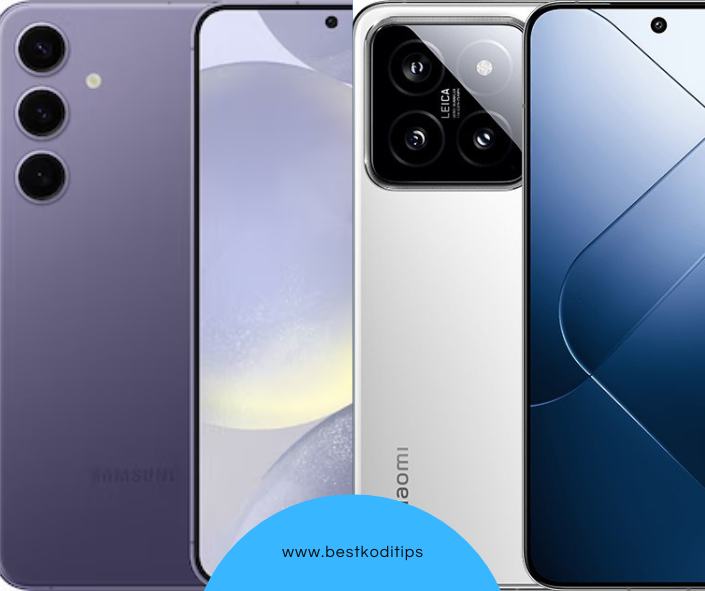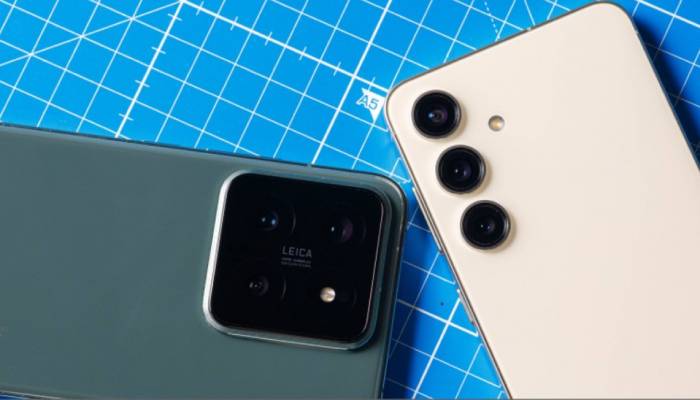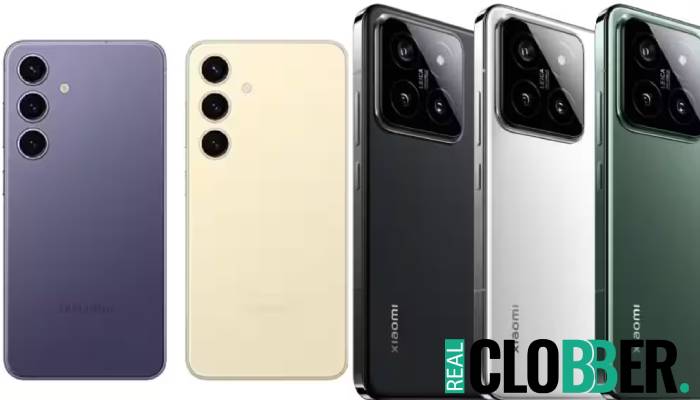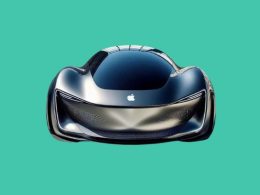Table of Contents Show
In the rapidly evolving world of smartphone technology, there are two compact high-end devices that stand out as worthy contenders: the Xiaomi 14 and Samsung’s Galaxy S24. Choosing between these two devices is a difficult task, as they both offer a plethora of features and specifications. In this comparison, we’ll dive into the details of each device and examine what sets them apart.
Display Duel
Both the Xiaomi 14 and Galaxy S24 boast stunning OLED displays, offering rich colors and smooth visuals. The Xiaomi 14 takes the lead with its slightly larger 6.36-inch LTPO AMOLED display, featuring a 1.5K resolution and Dolby Vision support, making it a treat for multimedia enthusiasts. Meanwhile, the Galaxy S24’s 6.2-inch 1080p LTPO AMOLED display impresses with HDR10+ playback support and a peak brightness of 2,600 nits. While both displays excel in their own right, the Xiaomi 14’s higher resolution and Dolby Vision compatibility may sway those seeking a cinematic viewing experience.
Design and Build

In terms of design, both devices exude elegance with their glass and metal chassis. The Xiaomi 14’s curved back offers a comfortable grip, while the Galaxy S24’s flat edges provide a sleek aesthetic. However, Samsung takes the lead in durability with its Gorilla Glass Victus 2 protection on both the front and back panels, along with an aluminum frame dubbed Aluminum Armor 2 for added toughness. Xiaomi, on the other hand, discloses a first-generation Gorilla Glass Victus only for the front panel. While both devices are easy to handle, Samsung’s attention to build quality may tip the scales for some users.
Performance Prowess
Under the hood, the Xiaomi 14 packs the Qualcomm Snapdragon 8 Gen 3 chipset, offering formidable performance for multitasking and gaming. In comparison, the Galaxy S24’s Exynos 2400 chip delivers reliable performance but may fall slightly behind in raw power. With superior memory configurations and UFS 4.0 storage, the Xiaomi 14 gains an edge in terms of speed and efficiency. Whether it’s seamless multitasking or immersive gaming experiences, the Xiaomi 14 shines as the performance champion in this matchup.
Camera Clash

When it comes to photography, both devices offer impressive camera setups. The Xiaomi 14’s triple rear camera system, featuring custom Leica Summilux lenses, captures stunning detail and clarity in various lighting conditions. Meanwhile, the Galaxy S24’s camera array delivers vibrant shots with its wide, telephoto, and ultrawide lenses. However, the Xiaomi 14’s superior low-light performance and advanced video recording capabilities, including 8K@24fps with Dolby Vision HDR, elevate it to the top spot for photography enthusiasts and content creators.
Battery Battle
In the realm of battery life and charging, the Xiaomi 14 emerges as the clear winner with its larger battery capacity and blazing-fast charging speeds. With a 4,610mAh battery and support for 90W fast wired and 50W wireless charging, the Xiaomi 14 ensures you stay powered up throughout the day. In comparison, the Galaxy S24’s 4,000mAh battery and slower charging rates may leave some users wanting more. Whether it’s extended usage or quick top-ups, the Xiaomi 14 outshines its competitor in the battery department.
Full Comparison
| Name | Xiaomi 14 | Samsung Galaxy S24 |
| General | ||
| Sim Type | Dual Sim, GSM+GSM | Dual Sim, GSM+GSM |
| Dual Sim | Yes | Yes |
| Sim Size | Nano+Nano SIM | Nano+Nano SIM |
| Device Type | Smartphone | Smartphone |
| Release Date | October 26, 2023 | January 17, 2024 |
| Design | ||
| Dimensions | 71.5 x 152.8 x 8.2 mm | 70.6 x 147 x 7.6 mm |
| Weight | 188 g | 167 g |
| Colors | Black, Silver, Pink, Green | Onyx Black, Marble Grey, Cobalt Violet, Amber Yellow, Jade Green, Sandstone Orange, Sapphire Blue |
| Display | ||
| Type | Color OLED Screen (1.07 B) | Color Dynamic AMOLED 2X (1B Colors) |
| Touch | Yes | Yes |
| Size | 6.36 inches, 1200 x 2670 pixels, 120 Hz | 6.2 inches, 1080 x 2340 pixels, 120 Hz |
| Aspect Ratio | 20.5:9 | 20.5:9 |
| PPI | ~ 460 PPI | ~ 416 PPI |
| Screen to Body Ratio | ~ 89.3% | ~ 90.9% |
| Glass Type | Corning Gorilla Glass | Corning Gorilla Glass Victus 2 |
| Features | Dolby Vision, 3000nits | 2600nits Brightness |
| Notch | Yes, Punch Hole | Yes, Punch Hole |
| Memory | ||
| RAM | 8 GB | 8 GB |
| Storage | 256 GB | 256 GB |
| Storage Type | UFS 4.0 | UFS 3.1 |
| Card Slot | No | No |
| Connectivity | ||
| GPRS | Yes | Yes |
| EDGE | Yes | Yes |
| 3G | Yes | Yes |
| 4G | Yes | Yes |
| 5G | Yes | Yes |
| 5G Bands | FDD Sub6L: N1(2100), N2(1900), N3(1800), N5(850), N7(2600), N8(900), N12(700), N20(800), N25(1900), N26(850), N28(700), N66(AWS-3), TDD Sub6: N38(2600), N40(2300), N41(2500), N77(3700), N78(3500) | |
| VoLTE | Yes, Dual Stand-By | Yes, Dual Stand-By |
| Vo5G | Yes | Yes |
| Wifi | Yes, with wifi-hotspot | Yes, with wifi-hotspot |
| Wifi Version | Wi-Fi 802.11 a/b/g/n/ac/6e, dual-band | 802.11a/b/g/n/ac/ax 2.4GHz+5GHz+6GHz, HE160, MIMO, 1024-QAM |
| Bluetooth | Yes, v5.4, A2DP, LE, aptX HD, aptX Adaptive | Yes, v5.3, A2DP, LE |
| USB | Yes, USB-C v3.1 | Yes, USB-C v3.2 |
| USB Features | USB on-the-go, USB Charging | USB on-the-go, USB Charging |
| IR Blaster | Yes | |
| Extra | ||
| GPS | Yes, with dual-band A-GPS, GLONASS, GALILEO, QZSS, NavIC, BDS (tri-band) | Yes, with A-GPS, Glonass, Beidou, Galileo, QZSS |
| Fingerprint Sensor | Yes, In Display | Yes, In Display |
| Face Unlock | Yes | Yes |
| Sensors | Accelerometer, Proximity, Gyro, Compass, Barometer, Color Spectrum | Accelerometer, Barometer, Gyro Sensor, Geomagnetic Sensor, Hall Sensor, Light Sensor, Proximity Sensor |
| 3.5mm Headphone Jack | No | No |
| NFC | Yes | Yes |
| Water Resistance | Yes, 1.5 m upto 30 min | Yes, 1.5 m upto 30 min |
| IP Rating | IP68 | IP68 |
| Dust Resistant | Yes | Yes |
| Extra Features | Dolby Atmos | E-Sim, Circle to Search, Live Translate, Transcript Assist, Photo Assist |
| Camera | ||
| Rear Camera | 50 MP 23mm, 1/1.31″, 1.2µm, dual pixel PDAF, Laser AF, OIS f/1.6 (Wide Angle) 50 MP 75mm, PDAF, OIS, 3.2x optical zoom f/2 (Telephoto) 50 MP 14mm, 115˚ f/2.2 (Ultra Wide) with autofocus |
50 MP 24mm, 1/1.56″, 1.0µm, Dual Pixel PDAF, OIS f/1.8 (Wide Angle) 10 MP 67mm, 1/3.94″, 1.0µm, PDAF, OIS, 3x optical zoom f/2.4 (Telephoto) 12 MP 13mm, 120˚, 1/2.55″ 1.4µm, Super Steady video f/2.2 (Ultra Wide) with autofocus |
| Features | Leica lens, Dual-Tone , HDR, Panorama | 50MP, Dual Tele Zoom System, Nightography (Selfie, Video), Super HDR (Photo, Video, Gallery), Generative Edit, Edit Suggestion, Optical Zoom 3x, Optical Quality Zoom 2x, Digital Zoom up to 30x |
| Video Recording | 4K @ 24 fps UHD, 1080p @ 30 fps FHD, 720p @ 1920 fps HD | 8K @ 30 fps UHD, 4K @ 30 fps UHD, 1080p @ 30/960 fps FHD |
| Flash | Yes, Dual LED | Yes, LED |
| Front Camera | Punch Hole 32 MP (Wide Angle) | Punch Hole 12 MP f/2.2 (Wide Angle) |
| Front Video Recording | 4K @ 30 fps UHD, 1080p @ 30 fps FHD | 4K @ 30 fps UHD, 1080p @ 30 fps FHD |
| Technical | ||
| OS | Android v14 | Android v14 |
| Custom UI | HyperOS | OneUI 6.1 |
| Chipset | Qualcomm Snapdragon 8 Gen3 | Samsung Exynos 2400 |
| CPU | 3.3 GHz, Octa Core Processor | 3.2 GHz, Deca Core Processor |
| Core Details | 1xPrime Core@ 3.3 GHz & 5xPerformance Cores@3.2 GHz & 2xEfficiency Cores@2.3 GHz | 1×3.2 GHz Cortex-X4 & 2×2.90 GHz Cortex-A720 & 3×2.60 GHz Cortex-A720 & 4×2.0GHz Cortex-A520 |
| GPU | Adreno 750 | Xclipse 940 |
| Java | No | No |
| Browser | Yes | Yes |
| Multimedia | ||
| Yes | Yes | |
| Music | MP3, FLAC, APE, AAC, OGG, WAV, AMR, AWB | MP3, M4A, 3GA, AAC, OGG, OGA, WAV, AMR, AWB, FLAC, MID, MIDI, XMF, MXMF, IMY, RTTTL, RTX, OTA, DFF, DSF, APE |
| Video | MP4, MKV, WEBM, 3GP | MP4, M4V, 3GP, 3G2, AVI, FLV, MKV, WEBM |
| FM Radio | No | No |
| Document Reader | Yes | Yes |
| Battery | ||
| Type | Non-Removable Battery | Non-Removable Battery |
| Size | 4610 mAh, Li-Po Battery | 4000 mAh, Li-ion Battery |
| Fast Charging | Yes, 90W Fast Charging | Yes, 25W Fast Charging |
| Wireless Charging | Yes, 50W | Yes, 15W |
| Reverse Charging | Yes, 10W | Yes |
| Reverse Wireless Charging | Yes, 4.5 | |
| Video Playback Time | 29 hours | |
| Music Playback Time | 78 hours | |
Conclusion
As we conclude our comparison between the Xiaomi 14 and Samsung Galaxy S24, it’s evident that both devices offer exceptional features and capabilities tailored to the demands of discerning users. While the Galaxy S24 impresses with its compact design and reliability, the Xiaomi 14 emerges as the ultimate compact powerhouse, boasting superior performance, camera prowess, and battery life. Whether you prioritize cutting-edge technology or brand loyalty, the Xiaomi 14 stands as a compelling choice for those seeking the pinnacle of compact, high-end smartphones in 2024.












